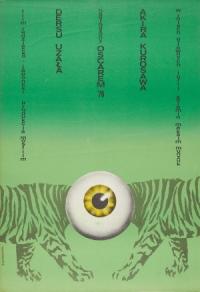 Our film club title for the month of July is Akira Kurosawa’s 1975 Dersu Uzala, the only film that Kurosawa filmed outside of Japan.
Our film club title for the month of July is Akira Kurosawa’s 1975 Dersu Uzala, the only film that Kurosawa filmed outside of Japan.
Following the disappointing commercial reception of the 1970 Dodesukaden, Kurosawa was at the low point in his career. The Japanese film industry was quickly shrinking, and unable to find funding for new projects while also suffering from poor health, Kurosawa attempted suicide on December 22, 1971. The attempt was unsuccessful.
In early 1973, the Soviet film studio Mosfilm approached Kurosawa asking if he would be interested in working on a new project with them. Kurosawa agreed to the idea and proposed to film an adaptation of Russian explorer Vladimir Arsenyev’s autobiographical work Dersu Uzala, a book Kurosawa had been considering for a film from as early as the 1930s. In the book, Arsenyev narrates his experiences with the titular Siberian hunter who acted as his guide for several expeditions to the Russian far east.
Shooting the film began in May 1974 on location in Siberia, and lasted for almost a year under demanding conditions. Dersu Uzala premiered in Japan on August 2, 1975 and did relatively well at the domestic box office, although the critical reception in Japan was muted. Abroad the film was better received, winning both the Golden Prize at the Moscow International Film Festival and an Academy Award for Best Foreign Language Film.
The last time we discussed Dersu Uzala at the film club was in March 2009, with the introductory post and its discussion found here and the other discussions accessible through the Dersu Uzala tag. You can also find much more about Dersu Uzala at dersuuzala.cba.pl.
For the availability of the film, see Kurosawa DVDs.
Next month, our attention turns to Hayao Miyazaki’s 1997 animated film Princess Mononoke, which shares themes with Kurosawa’s Dersu Uzala. The full film club schedule is available on the film club page.






I’m not sure I’ll get a chance to watch Dersu Uzala this month, I haven’t had the free time. I do wish Coco was still here commenting as her comments on Dersu last time were by far the most interesting I’ve read on the film. In truth, it is one of the Kurosawa films I most struggle with – I found it hard to really enjoy the film, which may well be a reflection of watching it on a relatively small screen at home rather than the cinema. I think this is one of those films you are supposed to immerse yourself within rather than just ‘watch’. And its much easier to do this in the cinema. It really does cry out for a full restoration and release to the cinemas.